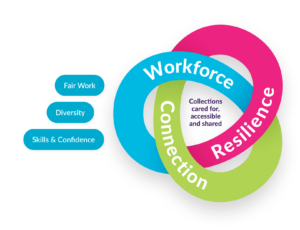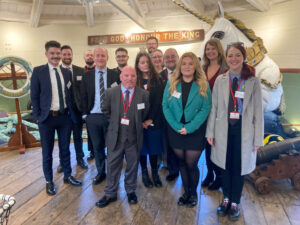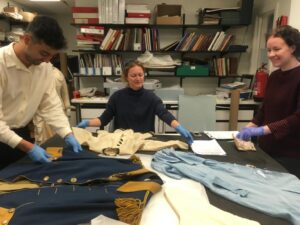- Museums Galleries Scotland
- Strategy Hub
- Workforce
Workforce
All people are welcomed, respected and their professional and lived experience valued within the museums and galleries sector. Museums and galleries actively diversify the workforce and adopt Fair Work principles. All employees and volunteers have access to opportunities that develop their skills and confidence.

- Last updated: March 27th 2024
- Further Strands
- Resilience
- Connection
Fair Work
Outcome
Scotland’s museums and galleries are attractive employers which offer positive working life experiences. They are places where Fair Work drives success, wellbeing, and prosperity for individuals, organisations, and society.
Sector actions
- Invest in development opportunities for all staff and volunteers.
- Implement fair and progressive practices across all areas of work including recruitment, pay, and contracts.
- Pay the real living wage and only use zero-hours contracts in appropriate ways.
MGS actions
- Support delivery of Fair Work practices by sharing access to relevant toolkits and resources.
- Continue to encourage good recruitment practices by promoting Fair Work approved jobs on the MGS website and advocating for the Fair Work First policy.
- Ensure that organisations which receive MGS grant funding meet good fair work practices.
Resources
You can find out more about the Fair Work priority area by reading articles, advice guides, blogs and case studies on the MGS website.
Diversity
Outcome
Scotland’s museums and galleries diversify the workforce (including trustees, staff, and volunteers) seeking to prioritise those who have been previously underrepresented.
Sector actions
- Review and improve recruitment processes to attract a more diverse workforce.
- Understand and address barriers within organisational cultures, including embedding anti-racism and anti-ableism practices, to build inclusive workplaces that support and attract a more diverse workforce.
- Value and embed a range of career entry and progression routes, including vocational learning, to provide opportunities for all.
- Proactively increase the diversity of sector leadership.
MGS actions
- Seek out and develop new partnerships to support diversification of the future workforce including working with young people to explore careers in culture.
- Improve recruitment processes by providing training and resources on areas including best-practice approaches to job advertising.
- Build the ability of the sector to support a diverse workforce by offering anti-racism and anti-ableism training.
- Support an increase in the number and diversity of volunteers through engagement with programmes such as Make Your Mark.
Resources
You can find out more about the Diversity priority area by reading articles, advice guides, blogs and case studies on the MGS website.
Skills & Confidence
Outcome
Scotland’s museums and galleries workforce has equal access to skills development opportunities and is empowered to operate ambitiously.
Sector actions
- Prioritise the development of skills essential to delivery of the strategy at all organisational workforce levels including vocational routes, leadership and ongoing continuous professional development.
- Support the development of core museum skills to meet identified skills gaps – currently in collections care.
- Encourage innovative, collaborative, and positive leadership.
MGS actions
- Continue to lead on delivering accredited learning, including Modern Apprenticeships, through the MGS Skills Academy.
- Improve sector skills and confidence through inclusive, tailored, and high-quality programmes that meet sector and strategy ambitions.
- Provide opportunities for the museum sector workforce to share their knowledge and practice.
- Enable the culture and heritage sectors to respond to the identified skills needs by collaborating with partners and contributing to the Our Place in Time Skills Investment Plan.
Resources
You can find out more about the Skills & Confidence priority area by reading articles, advice guides, blogs and case studies on the MGS website.

